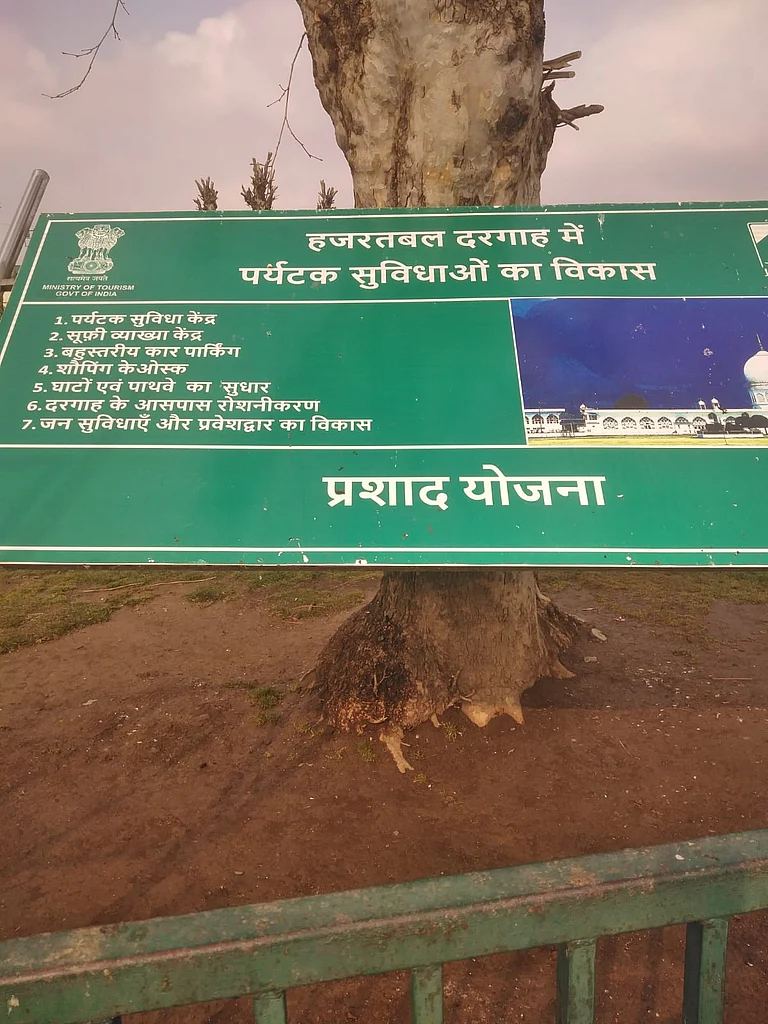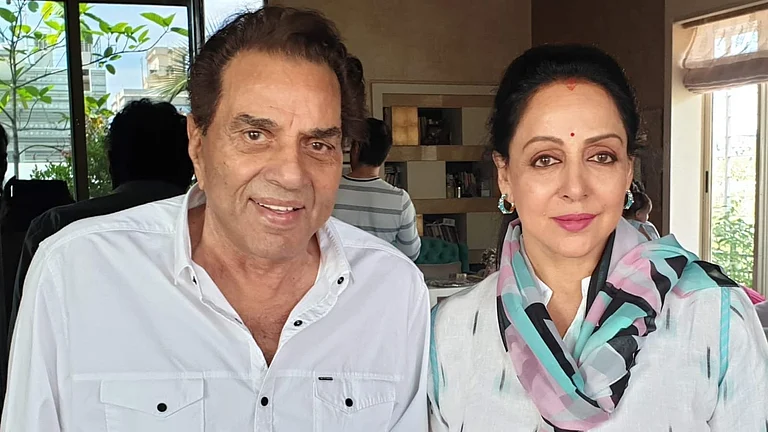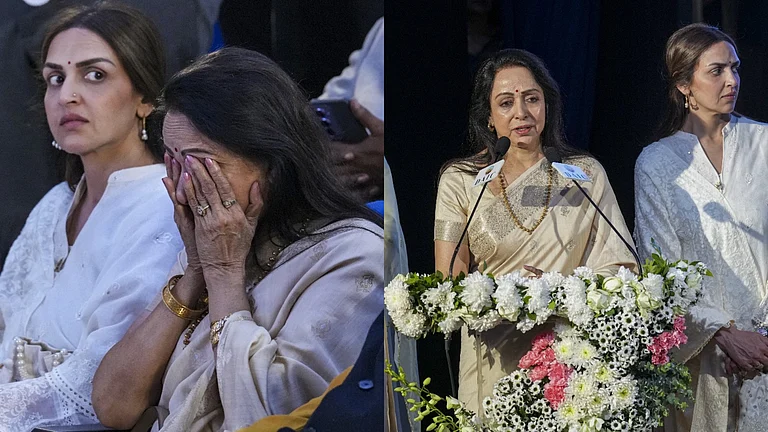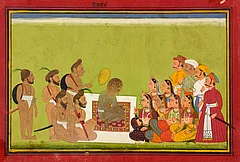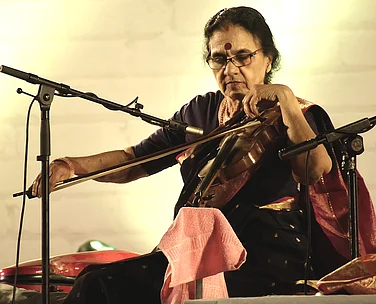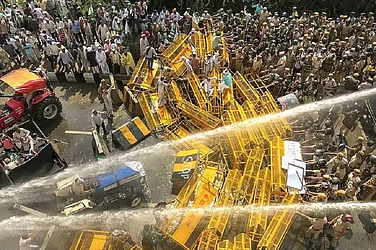The Kreupasanam Marian Shrine was teeming with devotees, a sea of faces marked by grief, desperation and faith. In the crowded hall, a line of people eagerly awaited their turn to give their testimonials, sharing stories of ‘miracles’ that had changed their lives. Their voices, sometimes cracking with emotion, filled the air with tales of miraculous healings, unexpected financial blessings and deliverance from addiction. As they spoke, the crowd listened intently, tears streaming down many faces, moved by the power of the ‘divine interventions’. On the other side, a solemn procession formed a queue before a priest, who was carrying a vessel of holy water. One by one, he blessed each devotee, pouring the ‘sacred water’ on to their heads, murmuring prayers for healing and relief. The mood was hysteric and the atmosphere was thick with the scent of incense and the sound of sobs, as people brought their problems—grief, diseases, debt, and addictions—before the altar, seeking solace and redemption.
Forty-six-year-old Ramya Mohan, while standing on the dais in the shrine, weeps as she testifies about the miracles the Kreupasanam Marian Shrine has bestowed in her life. A few years ago, she lost her three-year-old son in an accident and she too was severely injured. Being a devotee of Kreupasanam Shrine, she often asked Mother Mary why she had been given such a curse in her life. She was told that her child was sent to a better place where he is more secure and safe. Later, her health gradually improved. She received the answer from the ‘divine force’ that every bad thing in life is a test by the Almighty. Ramya said she was a Hindu by birth and finds peace of mind every time she comes to the church for serving the ‘covenant prayer’.
Hailing from Fort Kochi, Jessy, a fifty-four-year-old, is a regular visitor to the Kreupasanam Shrine. Her brother had blockages in his heart, and she made a covenant prayer for his recovery. He underwent heart surgery and recovered. Jessy believes that his recovery was due to the divine intervention of Mother Mary of Kreupasanam Shrine. She also had a piece of land that she had been trying to sell for a few years. Recently, the land was sold for a reasonable price, which she considers a miracle granted by Kreupasanam as a result of her devotion and prayer.
Forty-six-year-old Santhamma from Pathanamthitta has a series of stories to share: from the poverty and debt in her family—which have not yet been resolved—to her daughter’s divorce, and the ill health of her family members. “I had constant stomach pain and underwent all the tests, including a biopsy. I came here and prayed to Mother Mary, asking her to make the test result negative. It happened. The result was negative. My daughter was fighting her divorce case for many years. I made a covenant prayer and asked Mother Mary to come to the court and argue my daughter’s case. She did. We won the case,” says Santhamma. Everyone, including Santhamma, weeps while narrating their stories of struggle, grief, and the miracles granted by the ‘divine intervention’ of the Kreupasanam Shrine in their lives.
A controversy erupted a few years ago over stories of people ‘eating the newspaper’. There were also accounts of people burning the newspaper and adding the ashes to their food.
The Kreupasanam Marian Shrine, established in 1989 at Kalavoor in Alappuzha district, is not just a church where God provides miraculous solutions to the problems of devotees, it is also the publisher of a ‘divine newspaper’ registered with the government, and available in 15 languages—Malayalam, English, Odiya, Gujarati, Bengali, Tamil, Hindi, Marathi, Telugu, Kannada, Konkani, Italian, German, French and Spanish. While many places of worship offer instant solutions and miracles through prayer, the unique aspect of the Kreupasanam Shrine is that these miracles are documented in a legally registered newspaper which is also named Kreupasanam.
Kreupasanam newspaper is not like any other publication that carries news and current affairs. Instead, it shares the ‘news’ of people whose lives have been transformed by the divine intervention of the Kreupasanam Shrine. The newspaper includes ‘editorials’ written by the chief priest and editor-in-chief, V P Joseph Valiyaveettil. The editorials discuss the reasons why some people fail to receive blessings. One editorial illustrates the story of a girl who failed an examination. The priest explains that she did not comprehensively fulfil her covenant prayer, neglecting the charitable activities she had promised. In all 15 languages of the newspaper, similar stories of people who have experienced miraculous changes due to the blessings of the Kreupasanam Shrine have been carried.
However, the Kreupasanam Shrine and the newspaper have come under severe criticism and trolling on social media in recent times. A controversy erupted a few years ago over stories of people ‘eating the newspaper’ by adding it to their food. There were also accounts of people burning the newspaper and adding the ashes to their food. The ‘testimonials’ of curing diseases, getting employment, and resolving debt traps by ‘eating the newspaper’ have faced widespread criticism from rationalists.
In 2019, the Kerala Sasthra Sahithya Parishad (KSSP), a Left-leaning cultural organisation and people’s science movement, filed a complaint against the Shrine’s activities, accusing it of promoting superstition. However, the KSSP could not advance the complaint further due to the absence of a law prohibiting the promotion of superstition and black magic. “We organised several campaigns against Kreupasanam, but they are very powerful. We do not have a law as other states like Maharashtra,” says P V Joseph, KSSP’s south zone secretary.
Since then, the newspaper has started carrying a disclaimer stating that the Shrine would not be responsible if someone develops a problem by ‘eating the newspaper’. The disclaimer further asserts that Kreupasanam has no intention of promoting superstition.
A notable number of devotees who testify to the miracles of the divine Kreupasanam are Hindus. They include doctors, lawyers and engineering students.
The covenant prayer is a kind of a time-bound ‘contract with God’. A person engaging in a covenant prayer pledges to come and pray in the Shrine for a fixed term—three months, six months, one year or more. The person is expected to visit the Shrine according to the frequency agreed upon in their ‘covenant with God’. During this period, or anytime thereafter, the ‘Almighty’ may—or may not—perform miracles or bring solutions to their problems. If no miracle takes place, the devotees are told that they have not served the covenant conditions with complete dedication. Covenant prayer can also be done online—one needs to register through the website of Kreupasanam. The devotees should buy ‘divine oil’ and ‘divine salt’ from the counters in the Shrine. Devotees also have to buy a bundle of the Kreupasanam newspaper for Rs 100 (for each bundle).
Kreupasanam also runs a YouTube channel where testimonials are broadcast live. The channel features hundreds of testimonials in which people explain how their lives changed after committing to the covenant prayer at the Kreupasanam Shrine.
Interestingly, a notable number of devotees who testify to the miracles of the divine Kreupasanam are Hindus. In one video, Rajeswari of Vaikom, Kottayam district, shares that she had a dream where she saw a temple ‘disappearing’. When she continued to search for the temple, she saw the Kreupasanam Shrine. She committed to a covenant prayer, and her son, who had been struggling to get a job in the UAE, received a job offer.
The devotees of Kreupasanam are not uneducated people. Among them are doctors and lawyers. Ankitha Francis, a pulmonologist from Thrissur, Prinso Mathew, a lawyer and notary from Alappuzha, and Asmita, an engineering graduate from Ernakulam, narrate stories of miracles that changed their lives. Ankitha successfully completed her master’s degree, Prinso’s wife, Chitra, conceived after many years of waiting, and Asmita cleared the Duolingo English Test—a language qualification test to work and study abroad—after several attempts.
It is evident from these testimonials that achievements through medical science such as curing diseases or conceiving or usual life progressions, such as gaining employment, passing examinations, and constructing houses, are perceived as ‘miracles’ by people who are desperate and anxious.
However, no miracles happen in the lives of street vendors making a living around the Shrine. Sreeja, 46, has been selling lottery tickets for six years in front of the Shrine. Three months ago, she wound up selling lottery tickets and started selling packets of pappads instead. “Selling lottery tickets ended up in a huge loss. People who come here do not buy lottery tickets. Even those who buy tickets curse me when they fail to win. I am fed up,” says Sreeja. “People are not kind. It is easy for them to spend Rs 50 to buy a packet of pappad, but they don’t”. Even the pappad business is not lucrative, as the devotees tend to ignore street dwellers like Sreeja.
MORE FROM THIS ISSUE
The chief priest of the Kreupasanam Shrine, Valiyaveettil, was embroiled in a major controversy in 2019 when he was admitted to the hospital after contracting a viral fever. The priest was heavily trolled on social media for seeking the help of modern medicine when he fell ill. He later explained that he needed medical treatment because of the laborious task of listening to all the grieving experiences and hardships of people daily. “I take all their pain into my heart, so my illness cannot be cured just by prayer,” he said. As his response caused further trolling, the priest decided to stop talking to the media altogether. When Outlook reached out for a comment on the activities of the Shrine, the manager refused permission to talk to the priest.
(This appeared in the print as 'A Contract For A Miracle!')







